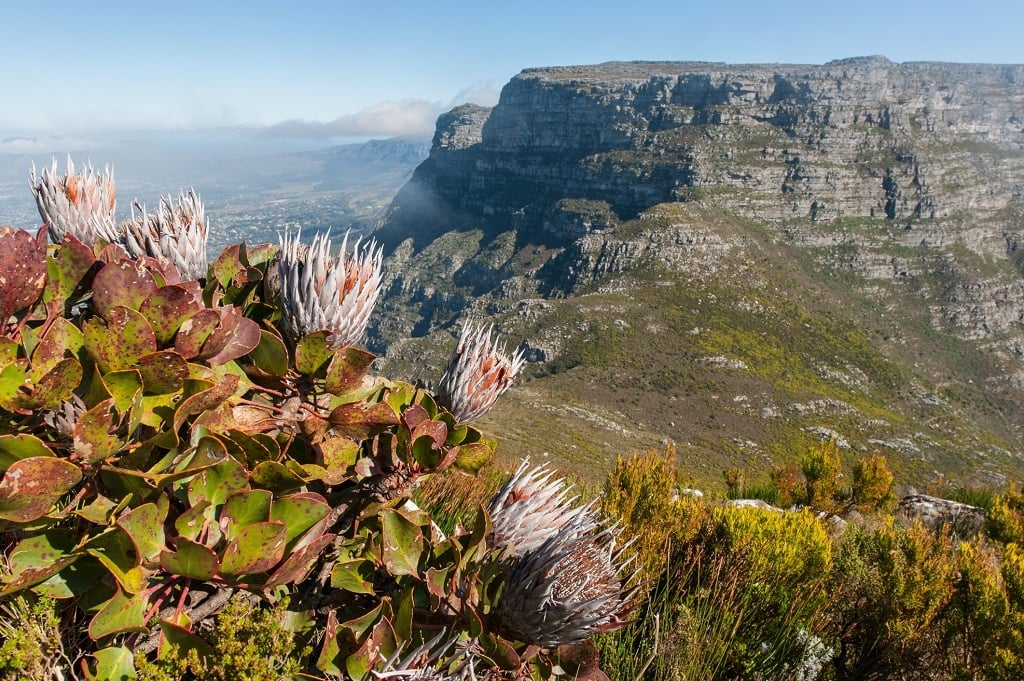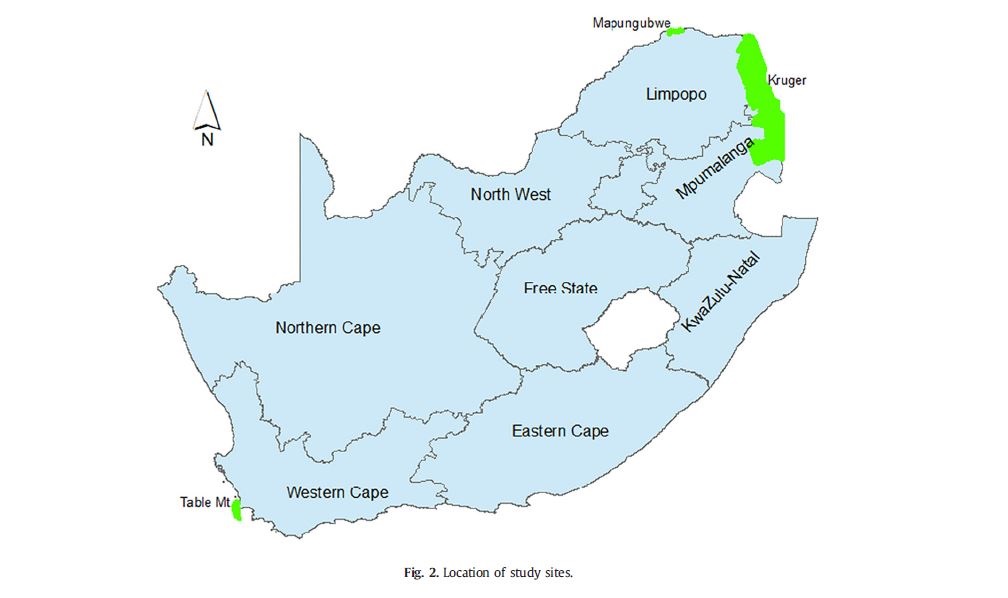
- Heritage sites within SA's national parks are highly vulnerable to climate change and extreme weather, a study shows.
- At risk are undiscovered artefacts that can be washed away in floods and natural plant species that can become extinct due to dry conditions.
- Increased funding for research, restoration, conservation and preservation work could help protect sites.
Climate change and extreme weather events are threatening heritage sites within South Africa's national parks, a study has found.
The paper, Climate change risk assessment of heritage tourism sites within South African national parks, was published in ScienceDirect in August. It notes that there is evidence that selected cultural heritage sites within SANParks are negatively impacted by climate change and extreme weather.
"Evidence points to a significant loss of heritage-related attractions through climate change and extreme weather events in national parks in South Africa. Slow onset climate events like sea-level rise, desertification and biodiversity loss also remain a huge challenge," the authors said in an emailed response to News24.
The authors - Professor David Chikodzi, Professor Godwell Nhamo, Dr Lazarus Chapungu and Professor Kaitano Dube - also noted that other attractions such as shipwrecks, archaeological artefacts, buildings, ornaments, unique biodiversity and other invaluable heritage assets are also at risk.
The study was approved by the government agency SANParks. The findings have been shared with the agency.
The research echoes concerns raised by the United Nations Educational, Scientific and Cultural Organisation (Unesco) that climate change is negatively affecting world heritage sites.
The study focused on world heritage sites recognised by Unesco - Mapungubwe National Park, as well as the Table Mountain National Park, which forms part of the Cape Floral Kingdom. The Kruger National Park, which includes the Thulamela ruins, was also part of the study.
Both Mapungubwe and Thulamela are in Limpopo or the northern parts of South Africa. These sites are known for their cultural heritage and include remnants of ancient civilisation, trade and the development of the southern Africa region, the paper highlighted. Table Mountain in the Western Cape is known for its biodiversity and endangered plant species, hosting natural heritage.
The study included various site analyses, tourist surveys, and interviews to understand the perception of the threat of climate change on the heritage sites.
READ | Many Angolans are unaware of climate change. But those who are, say it's making life harder
The findings show that extreme temperatures, flooding and intense rainfall are the top three climate change-related events impacting Mapungubwe. Those interviewed indicated that the artefacts – metals, copper and pottery – at the site are "very sensitive" to high temperatures. "These expand and sometimes break when exposed to intense temperatures," the paper indicated.
Floods may also potentially "wash away" undiscovered heritage assets and can damage the ancient structures on the site. "Intense rainfall combined with warming temperature accelerate the pace of rusting and moulding of artefacts leading to their degradation," the paper read.
Fading rock art
Rock art at Mapungubwe is also at risk of being impacted by intense rainfall and temperature changes. Rock art is already showing signs of fading. "In particular, salts that build up due to running water over the rock surface leave insoluble salts that corrode the rock and reduce the visual appeal of the rock art," the paper read. Another paper, African heritage in a changing climate, published in 2020, similarly highlights the risks climate change poses to preserving rock art.
The authors recommended some measures to protect the site against extreme heat include having the artefacts stored in air-conditioned museums or storerooms to reduce degradation. It is much more difficult to have adaptive measures in place for flooding.
For Thulamela, the paper noted that high temperatures, heavy rainfall and possible flooding were the top three climate change-related threats. High temperatures contribute to the breakage of artefacts. The heat also affects workers and visitors:
Extreme heat is also expected to impact the pace of archaeological excavations.
Heavy rainfall and flooding risk damaging ruins and washing away artefacts that have not yet been excavated. "Heavy rains also limit site access, which may impact conservation and preservation efforts."
The authors indicate the adaptability to high temperatures and flooding is very low.
Drought, warming temperatures and declining rainfall were identified as the three main climatic impacts on Table Mountain. Rising temperatures are a massive threat to heritage plant life. Hot temperatures combined with drought and declining rainfall would result in the "massive drying and even eventual extinction" of key plant species, the paper highlighted.
Other factors outside climate change that can impact the site include wildfires, land development, over-tourism, over-harvesting of plants, and possible land grabs. Adaptation to warming temperatures is relatively low.
"Overall, the heritage of the studied South African national parks is, to a large extent, highly vulnerable to the effects of climate change. Risks imposed by climate change are also high, and the capacity to adapt is still very limited," the authors wrote.
Protecting sites
For the protection of these sites, they recommend increased funding to be directed toward research, restoration, conservation and preservation work. Funding should also be made available for excavations at Mapungubwe and Thulamela, which has so far been limited. The excavations are needed to preserve undiscovered artefacts at the sites.
"More protection must be given to the greater Mapungubwe area, as it is surrounded by land uses that can potentially destroy undiscovered heritage," the authors highlighted.
Apart from protecting sites from fires and putting in place coastal defence systems to guard against flooding, they also recommend the construction of museums to preserve artefacts and other "vulnerable tangible" heritage.
The authors further suggest that some areas of Table Mountain National Park needed restricted access – to prevent human-induced damage to the site. They also encourage removing alien invasive species that contribute to the risk of wildfires.
They note the importance of improving awareness among visitors or tourists at these sites of the risks associated with climate change on the heritage sites.
READ | Australia to set aside at least 30% of its land mass to protect endangered species
Commenting on the research, Dr Nicholas Simpson, senior advisor to the Africa Climate Mobility Initiative (UN, World Bank & AU) and postdoctoral research associate at the University of Cape Town's African Climate and Development Initiative, said that a big part of responding to climate change requires first understanding its risks.
Simpson is also the coordinating lead author of the White Paper on climate risk to heritage for the International Council on Monuments and Sites and is a lead author on the Intergovernmental Panel on Climate Change's (IPCC) sixth assessment report on climate change impacts, adaptation and vulnerability.
Simpson said the research would contribute to SANParks' understanding of the risk climate change poses to heritage and tourism in national parks. "We are very uninformed on the response because we are still uninformed on vulnerability and risk. This study is a good step towards that, but we need hundreds more," Simpson said.
Simpson has conducted similar research on the impact of climate change on Africa's coastline. A study he co-authored, African heritage sites threatened as sea-level rise accelerates, shows that about 56 or 20% of all sites assessed are at risk of a one-in-a-100-year coastal extreme event such as flooding or erosion. High emissions driving climate change will see the number of sites exposed to extreme events more than triple to 198 by 2050.
Simpson shares that there is "incredible architecture" and "painful history" to protect on Africa's coast. "To lose all of that heritage would be losing a lot of our memory, our identity and who we are, going forward," Simpson said. The other risk is losing the heritage we are creating now for future generations.
Simpson said it is important to invest in research to figure out how to preserve these heritage sites.
He added that Africa is uniquely positioned to lead the global understanding of what heritage is and the responsibility to protect it. Heritage spans the African continent. It is in the wildlife and in the cultural, linguistic and indigenous knowledge systems.
"If you care about heritage, you should care about mitigating climate change, and you should care about decarbonising the economy. You should care about a rapid and just transition to renewable energy sources. Otherwise, there is a lot of heritage we risk to lose at the current rates and future projections of climate change," Simpson said.




 Publications
Publications
 Partners
Partners













